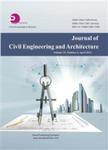Fuel Poverty and Comfort in Modern Residential Apartments in Developing Countries: A Case from Jordan
Fuel Poverty and Comfort in Modern Residential Apartments in Developing Countries: A Case from Jordan作者机构:Department of Architecture Faculty of Engineering and Technology University of Jordan Amman 11942 Jordan
出 版 物:《Journal of Civil Engineering and Architecture》 (土木工程与建筑(英文版))
年 卷 期:2014年第8卷第4期
页 面:405-412页
学科分类:080705[工学-制冷及低温工程] 08[工学] 082304[工学-载运工具运用工程] 0807[工学-动力工程及工程热物理] 0823[工学-交通运输工程]
主 题:Fuel poverty household residential sector thermal comfort primary energy Jordan.
摘 要:Energy is one of the most important resources in the economy of developing countries. Jordan depends mainly on imported oil and gas at international prices. This creates a heavy burden upon Jordanian national economy, which is reflected in the same time on other sectors of the Jordanian society. The ever increasing fuel prices make it very necessary to look for new renewable energy resources. Jordan as a developing country with its fast growing urban development and construction projects will be studied. It is worthy to study the dynamic relationship between end user, fuel and comfort in the residential sector. Energy is a chronic problem in Jordan, due to lack of non renewable energy resources, the end consumer is influenced by this fact, in achieving his basic energy needs. This study tries to shed light on the fuel poverty line, definitions and parameters of fuel poverty. And to study what has been done in this regard on both international and local level. No studies have been identified in Jordan which, explore the problem of fuel poverty, especially after the vast and recent increase in fuel prices internationally and locally. This study will follow theoretical and field survey to understand the relationship between comfort, energy and building fabric. Method will depend mainly on field survey and statistical data, and necessary measurements, questionnaires will be adopted when necessary to explore comfort levels related to fuel consumption. Summary and recommendations will be concerned with how thermal comfort could be achieved within the ranges of fuel accessibility, building fabric, minimum pollution and cost.



